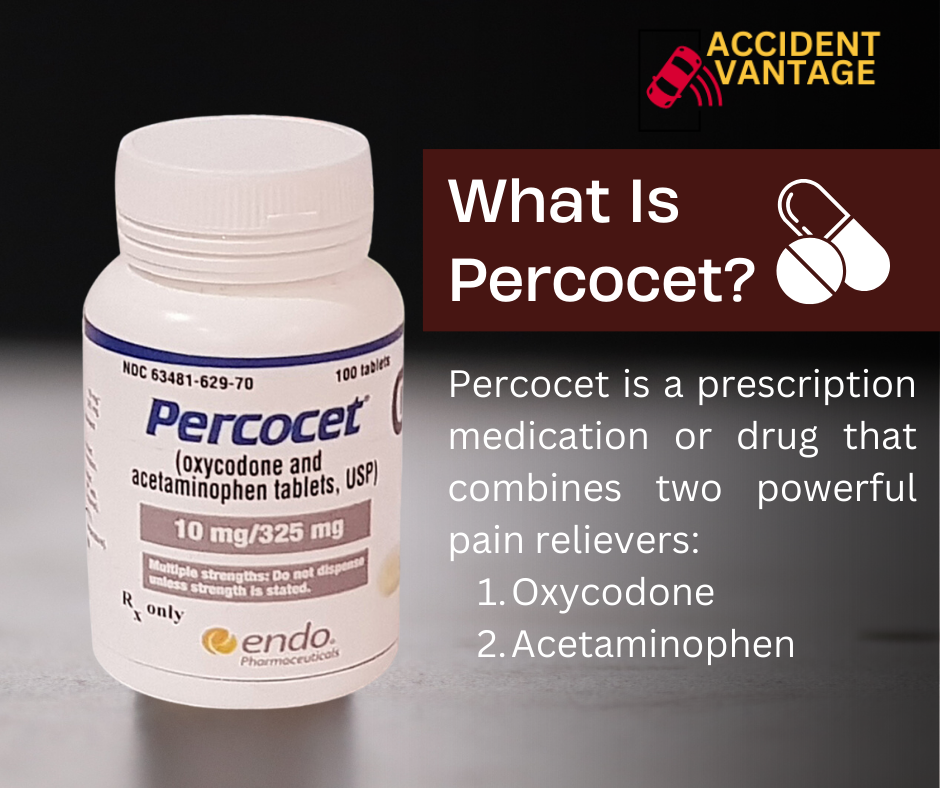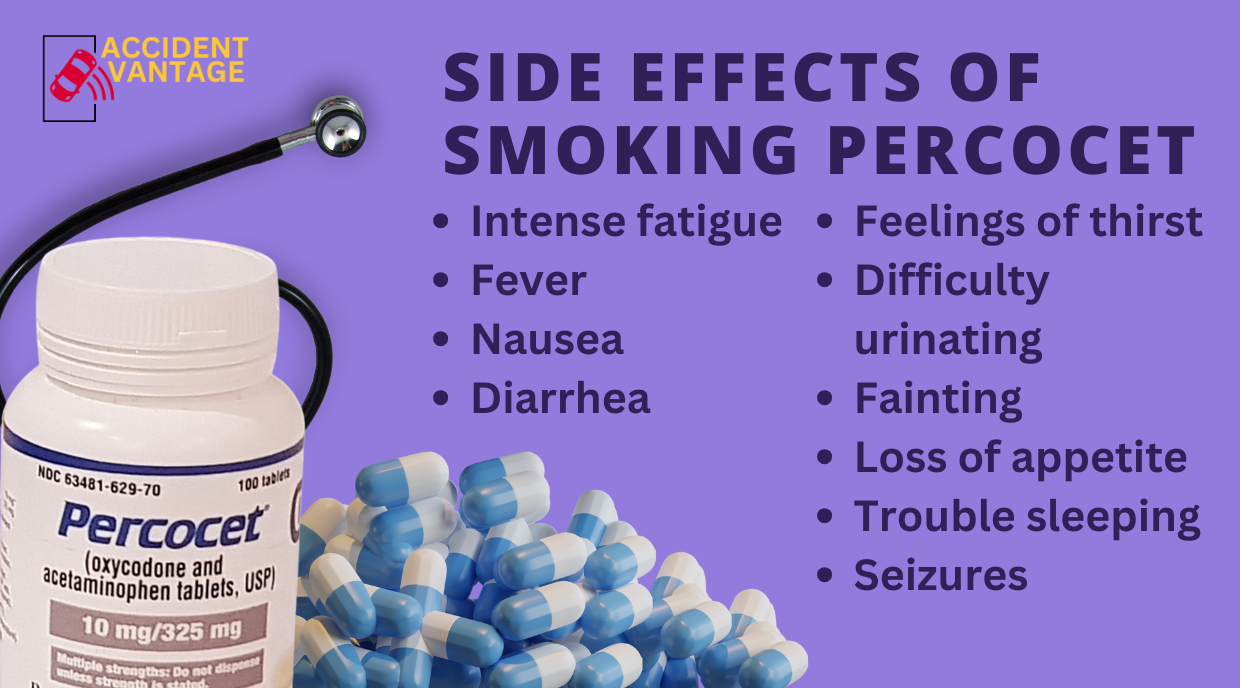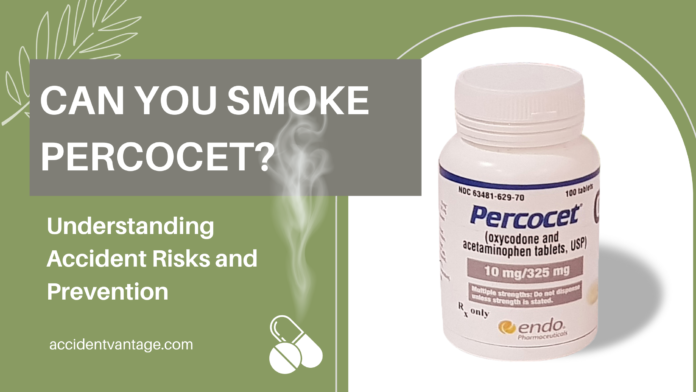Ever wondered if lighting up a Percocet is as bad an idea as it sounds? Well, buckle up because we’re about to break down this burning question: can you smoke Percocet? We’re not talking about the latest hot trend here; we’re diving into the serious business of accidental mishaps and how they skyrocket when you mix opioids and a flame.
Let’s throw some stats your way to kick things off – it’s like a reality check but with numbers. As per the National Institute on Drug Abuse (NIDA), around 21-29% of patients prescribed opioids end up abusing them. Now, that’s a chunk of the population playing with fire, quite literally.
But wait, there’s more. The Centers for Disease Control & Prevention (CDC) chimes in, reporting that in 2019, there were over 70,000 drug overdose deaths in the U.S. And guess what? Opioids, including Percocet, were in the driver’s seat for nearly 50,000 of those fatalities. It’s like a warning siren going off – “Caution: mixing opioids with anything but Caution might lead to disaster.”

So, Can You Smoke Percocet? Short Answer: Bad Idea!
Long answer: buckle in because we’re about to unpack the risks and arm you with the knowledge to steer clear of this potentially explosive combo. It’s not just about saying no – it’s about knowing why and avoiding the highway to accidental mayhem.
What Is Percocet? – All You Need to Know
Percocet is a prescription medication or drug that combines two powerful pain relievers: oxycodone and acetaminophen. It’s typically used to manage moderate to severe pain, like after surgery or due to chronic conditions. The opioid component works on the brain to alter how the body feels and responds to pain, while acetaminophen enhances the pain-relieving effects. Physicians commonly prescribe Percocet after surgeries, injuries, or for conditions causing persistent pain when other non-opioid pain medications prove insufficient.
But today, we’re not just talking about what it is; we’re digging deeper into the risks of smoking it to better answer your question: can you smoke Percocet?
Percocet is a medication that falls under the broader category of opioids. These drugs are potent pain relievers, and they have a legitimate place in medical practice. However, when used incorrectly, especially when abused or misused, they can lead to severe consequences.
Percocet Composition
Percocet is composed of two main active ingredients:
Oxycodone:
This constitutes the opioid component of the Medication. Oxycodone operates by attaching to opioid receptors located in the brain and spinal cord, thereby reducing the sensation of pain. While highly effective in alleviating pain, it carries the risk of improper use and the development of dependency.
Acetaminophen:
This is a common over-the-counter pain reliever and fever reducer. It’s included in Percocet to enhance its pain-relieving effects. However, acetaminophen can be harmful to the liver in large doses.
What is Percocet Used For?
Percocet is commonly prescribed for the management of moderate to severe pain. It’s often used in situations where other non-opioid pain medications may not provide sufficient relief. The popular applications of Percocet include:
- Post-Surgery Pain: Percocet is frequently prescribed after surgical procedures to alleviate pain during the recovery period.
- Injury Pain: It manages pain resulting from injuries, such as fractures, sprains, or trauma.
- Chronic Pain Conditions: For individuals experiencing persistent and significant pain due to chronic conditions, such as arthritis or certain types of cancer.
- Dental Procedures: Dentists may prescribe Percocet for managing pain after certain dental surgeries or procedures.
- Pain Management: In cases where other pain management strategies have proven inadequate, Percocet may be considered for short-term use.

Can You Smoke Percocet?
In straightforward terms – can you smoke Percocet? Absolutely not. It’s not just a matter of breaking the rules; it’s about steering clear of a potential health hazard.
Percocet, a blend of oxycodone and acetaminophen, is designed for pain relief, not puffing. When you light it up, you’re tinkering with the chemistry, and that’s a road best left untraveled.
Oxycodone, the opioid heavyweight in Percocet, plays by specific rules. Straying from the prescribed path opens the door to respiratory issues, addiction woes, and the grim possibility of an overdose.
Consider it like this – your doctor handed you a carefully crafted plan. Going off-script, especially with potent opioids, is akin to navigating uncharted waters without a compass.
The stats reinforce the seriousness: around 25% of those with a legitimate opioid prescription deviate from the guidelines, per the National Institute on Drug Abuse (NIDA). It’s not fear-mongering; it’s a reality check.
So, can you smoke Percocet? In professional terms, it’s a clear “NO.” This isn’t about stifling independence; it’s about prioritizing your well-being. Keep those pills in their lane – swallowed precisely as directed. Your health is the priority, after all.
Can You Snort Percocet? – Navigating the No-No Zone
So, the burning question: Can you snort Percocet? Technically, yes, but it’s like playing with fire in a dynamite store. Percocet, with its oxycodone and acetaminophen tag team, is meant for swallowing, not snorting. Sure, snorting might offer a shortcut to feeling the effects, but it’s a fast track to respiratory trouble, addiction, and overdose.
The Centers for Disease Control and Prevention (CDC) warns that opioids like Percocet can make you doze off – add snorting, and it’s like dozing off on a tightrope.
Bottom line: Can you snort Percocet? Technically.
Should you? Absolutely not.
Safety comes first, always!
Read more: How to Detox from Weed: A Step-by-Step Guide to Cleansing Your System

Side Effects of Smoking Percocet
The side effects of smoking Percocet extend beyond the well-known risks associated with its oral consumption. While Percocet itself can bring about various side effects, the act of smoking Percocet introduces a new set of potential health concerns that you should know before thinking about “Can You Smoke Percocet?”
Common Side Effects of Percocet
Before delving into the implications of smoking Percs, let’s revisit the general side effects associated with its use. These can include:
- Intense fatigue
- Fever
- Nausea
- Diarrhea
- Seizures
- Feelings of thirst
- Difficulty urinating
- Fainting
- Loss of appetite
- Trouble sleeping
- Sensations of anxiety and nervousness
- A slow heartbeat
Notably, the question “Can You Smoke Percocet?” and actually smoking Percocet misuse can lead to feelings of euphoria and pleasure, paving the way for addiction.
Side Effects Specific to Smoking Percocet
Now, let’s focus on the side effects specific to smoking Percs. The act of inhaling this Medication can bring about distinctive consequences.
- Coughing: Smoking Percs may lead to persistent coughing, impacting respiratory health.
- Weakness: Users might experience a sense of weakness or lethargy, possibly tied to the altered method of ingestion.
- Drowsiness: Drowsiness can intensify when Percocet is smoked, further compromising alertness.
- Burning Sensations: The inhalation of smoke may result in a burning sensation in the eyes and throat, potentially causing discomfort.
- Gastrointestinal Issues: Snorting Percs can contribute to gastrointestinal problems, such as nausea and vomiting.
Percocet Overdose Risk
One of the primary dangers associated with snorting or smoking Percocet is the heightened risk of overdose. Regardless of the method of intake, snorting Percocet has the potential to overwhelm the system, leading to a medical emergency that, in severe cases, may result in fatality.
The specific medical issues culminating in death can vary based on factors such as the dosage, underlying health conditions, and concurrent use of other drugs alongside snorting Percocet. However, in most instances, overdose occurs due to a significant slowing of both breathing and heart rate, ultimately ceasing altogether. In the absence of immediate medical intervention to counteract the drug’s effects on the body, death becomes an imminent outcome.
Certain circumstances may increase the risk of Percocet overdose:
- Crushing and Smoking Percocet
There is an elevated danger of overdose when extended-release versions of Percocet are crushed and either smoked or snorted at once. So, for “Can You Smoke Percocet?” It’s a No!
2. Combining with Respiratory Depressants
Concurrent use of other substances that depress the respiratory system, such as sedatives or alcohol, heightens the risk of overdose when taken alongside smoking Percs.
3. Underlying Medical Conditions
Individuals with pre-existing respiratory, cardiac, or other medical disorders may face complications with high-dose smoking Percocet use, increasing the risk of overdose.
4. Post-Abstinence Usage
The risk of overdose is heightened after a period of abstinence, as the body’s tolerance may be reduced, increasing susceptibility to the drug’s effects.
5. Influence of Others
The presence of individuals also under the influence of substances further escalates the risk of overdose.
The Dangers of Smoking Percocet – Can You Smoke a Percocet?
Now, let’s talk about the dangers of smoking Percocet. Here’s why you should never smoke Percocet:
- Health Hazards: Lighting up releases harmful toxins, a risky move for your well-being.
- Medication Misfire: Smoking messes with the intended pain relief. It’s a recipe for wasted meds and accident risks.
- Toxic Exposure: Inhaling toxic fumes harms your lungs and overall health – it’s no ordinary smoke break.
- Ineffective Relief: Smoking Percocet won’t bring the pain relief you’re after. It’s an inefficient use of the Medication.
- Addiction Accelerator: Faster onset means higher addiction risk. Don’t gamble with a downward spiral – steer clear of smoking opioids.
Can You Smoke Percocet While Driving?
Absolutely not. Smoking Percocet while driving is strongly discouraged due to its potential to pose severe safety risks. Oxycodone, found in Percocet, is an opioid that can induce drowsiness and impair cognitive functions. Introducing smoking while operating a vehicle can exacerbate these effects, compromising alertness and reaction times.
In no uncertain terms, smoking Percocet while driving is strictly contraindicated. This is not a suggestion but a critical safety imperative. Driving demands heightened attentiveness and swift reactions, qualities that can be compromised under the influence of this Medication, especially when combined with smoking.
Prioritizing safety, both for the individual and others on the road mandates refraining from smoking Percocet while driving. Reserve smoking activities for a secure, stationary environment, and ensure that pain relief measures are undertaken with due consideration to road safety. The welfare of all road users remains paramount.
Accident Risks – Can You Smoke Percocet While Driving?
Let’s explore the accident risks in more detail. Accidents can happen to anyone, but when you’re under the influence of a substance like Percocet, your chances of making poor decisions and being involved in accidents increase significantly. Here’s why:
- Impaired Judgment
Oxycodone, the opioid in Percocet, can affect your cognitive function and impair your ability to make sound judgments. Simple tasks like crossing the street or driving a car become perilous when your decision-making is compromised.
2. Coordination Issues
Opioids can also affect your coordination. Your physical movements may become unsteady and uncoordinated, making slips and falls more likely.
3. Risk of Overdose
Smoking Percocet can lead to rapid absorption of the drug, increasing the risk of overdose. An overdose of opioids can be life-threatening, and it often requires immediate medical intervention.
4. Mixing with Other Substances
Combining Percocet with alcohol or other drugs can be a recipe for disaster. The interactions can lead to unpredictable and dangerous effects, increasing the likelihood of accidents and overdose.
The Wider Opioid Crisis in U.S. – Facts and Figures
To thoroughly understand the magnitude of the problem, it’s important to understand that the misuse of prescription opioids, including drugs like Percocet, has contributed significantly to what’s known as the opioid crisis in many parts of the world, particularly in the United States. Here are some critical statistics and facts related to the opioid crisis:
- In the United States, over 70,000 drug overdose deaths were reported in 2019, with opioids being a significant contributor.
- According to the National Institute on Drug Abuse (NIDA), opioids, which encompass prescription opioids such as Percocet, contributed to over 47,000 overdose deaths in the year 2018.
- The opioid crisis has led to a substantial increase in the number of people seeking treatment for opioid use disorder and addiction.
So, you better read these facts before even thinking, “Can You Smoke Percocet?”
Can You Smoke Percs? – A Reality Check
Can you smoke Percs? Technically, you can, but let’s not beat around the bush—it’s a big “no-go.”
Percs, with their oxycodone and acetaminophen duo, aren’t meant for a smoke break. It’s like trying to teach a cat to tap dance – it will not end well.
Sure, some might think smoking Percs is a shortcut to feeling the effects faster. But hold up—this isn’t a race. It’s a carefully paved road to potential respiratory troubles, addiction, and a dance with overdose.
So, can you smoke Percs? Technically. Should you? Absolutely not. Stick to the script—pop ’em as prescribed. Safety comes first, always.
Read more: Matthew Perry Death: ‘Friends’ Star Dies at 54 in Suspected Drowning Accident

Smoking Percocet Addiction and its Consequences
Continued use of smoking Percocet can lead to physical dependence. When combined with psychological reliance on the drug, it evolves into addiction – a persistent medical condition that escalates the likelihood of overdose, accidents, and social complications linked to substance use.
Any form of Percocet misuse, including crushing the pills and subsequently smoking Percocet or snorting Percocet, substantially elevates the risk of developing an addiction. When smoking Percocet addiction takes hold, it may result in:
- Financial Struggles
The individual may face financial difficulties due to the expenses associated with obtaining Percocet or dealing with the repercussions of addiction.
2. Health Complications
Misuse of smoking Percocet can lead to various health issues, adding a layer of concern for individuals grappling with addiction.
3. Relationship Challenges
Addiction to smoking Percocet can strain relationships, causing problems with family, friends, and colleagues.
4. Heightened Tolerance
Individuals with Percocet addiction often develop an increased tolerance, necessitating higher doses for the desired effects. This raises the risk of overdose or accidents associated with high-dose use.
Treatment of Smoking Percocet Addiction
Dealing with an addiction is no walk in the park, especially when it involves a powerful medication like Percocet. Let’s discuss different types of treatment for Percocet addiction.
- Recognizing the Problem
The very first step in treating Percocet addiction is recognizing that you have a problem. Sometimes, it’s not easy to admit, but acknowledging the addiction is crucial. If you or someone you know is struggling with Percocet addiction, don’t be afraid to seek help.
2. Professional Help
When it comes to treating Percocet addiction, it’s often best to turn to the experts. Your healthcare provider is a great place to start. They can evaluate your situation and recommend a treatment plan tailored to your needs.
3. Medical Detox
Percocet is an opioid, and quitting it cold turkey can lead to severe withdrawal symptoms. Medical detox is a safe way to gradually reduce your dependence on the drug under medical supervision. It helps manage the discomfort and cravings.
4. Behavioral Therapy
Behavioral therapy stands as a cornerstone in addiction treatment. This form of therapy aids individuals in identifying and altering the behaviors that contributed to their addiction. Whether conducted one-on-one or in a group setting, therapy sessions create a secure environment to delve into the emotional and psychological facets of addiction.
5. Medication-Assisted Treatment (MAT)
MAT combines Medication with counseling and therapy to address addiction. For Percocet addiction, certain medications like buprenorphine may be prescribed to diminish cravings and withdrawal symptoms. These medications can make the recovery process more manageable.
6. Support Groups
Support groups are a valuable part of addiction treatment. They provide a sense of community and shared experiences. Groups like Narcotics Anonymous (N.A.) or SMART Recovery can be a source of encouragement and understanding during your recovery journey.
7. Relapse Prevention
Relapse can happen, but it doesn’t mean the end of your recovery. It’s essential to have a plan in place to prevent and manage relapses. Behavioral therapy can teach you strategies to cope with triggers and stressors that might lead to relapse.
8. Lifestyle Changes
Changing your lifestyle is a critical part of recovering from Percocet addiction. This may involve adopting healthier habits, finding new hobbies, and avoiding people or situations that can trigger drug use. Your treatment plan will help you make these positive changes.
9. Family and Social Support
Involving your loved ones in your recovery can make a significant difference. Family therapy and support can help mend relationships and provide the emotional backing you need during treatment.
10. Long-Term Recovery
Recovery from Percocet addiction is a journey, and it doesn’t end when you complete a treatment program. It’s a lifelong commitment to maintaining a drug-free life. This includes ongoing therapy, regular check-ins with your healthcare provider, and staying connected with support groups.
Further Resources and Support for Percocet Addiction
If you or someone you know is dealing with addiction or substance abuse like smoking Percocet or snorting Percocet, don’t hesitate to reach out for help. There are numerous resources available to assist you on the path to recovery:
- National Helpline: Call 1-800-662-HELP (1-800-662-4357) for confidential and immediate assistance.
- SAMHSA (Substance Abuse and Mental Health Services Administration): Visit their website for resources and treatment options.
- Local Support Groups: Consider joining local support groups or seeking help from addiction treatment centers in your area.
Remember, you’re not alone in this journey; people and organizations are ready to support you. Your health and well-being are worth it.
Read more: Ultimate Guide to Choosing an Auto Accident Attorney Dynomoon: Expert Tips and Insights
Conclusion
Smoking Percocet is a risky, dangerous practice with severe consequences. It can lead to accidents, overdose, and addiction. We hope this in-depth exploration has shed light on the dangers of smoking Percocet and why it should never be considered as an option.
Your safety and well-being should always be the top priority. Follow your doctor’s guidance, use medications responsibly, and seek help if you or someone you know is struggling with substance abuse or addiction. There is a path to recovery, and you’re never alone in this journey.
We’ve reached the end of our discussion, but the importance of this topic cannot be overstated. Stay safe, take care, and remember that there’s always hope and help available.
For more insights on accident news and expert legal advice, visit accidentvantage.com, your go-to destination for comprehensive information and guidance.
Read more: Can I Lose My House Due To At-Fault Car Accident? Exploring Liability, Protection, and Prevention
Frequently Asked Questions – FAQs
1. Can You Smoke Pills?
Can you smoke a pill? Technically, yes, but it’s like playing with fire in a paper factory. Pills, like Percocet, are designed for swallowing, not smoking. Sure, some might see it as a shortcut, but it’s more like a detour into respiratory trouble, addiction, and overdose. The Centers for Disease Control and Prevention (CDC) warns opioids can make you nod off – now imagine that with a side of smoke.
2. How Do People Smoke Pills?
Smoking Percocet? Bad idea. Seriously bad. It’s like trying to put out a fire with gasoline. Pills are meant for swallowing, not lighting up.
First off, it’s dangerous as hell. The chemicals in those pills aren’t made for a barbecue. Plus, you’re playing Russian roulette with your health. Breathing in that smoke? A recipe for disaster. If you’re looking for a thrill, find a roller coaster. Don’t turn your meds into a smoke show.
3. Is Percocet an Opioid?
Yes, Percocet is classified as an opioid. It contains oxycodone, which is an opioid analgesic. Opioids are a class of drugs that act on the nervous system to relieve pain, and Percocet is commonly prescribed for the management of moderate to severe pain.
4. What is the Full Name of the Drug Percocet?
Percocet’s generic name is oxycodone acetaminophen. The brand name Percocet is a combination of oxycodone and acetaminophen, the latter being commonly recognized as Tylenol.
5. Can You Smoke a Percocet?
No, you can’t. The notion of smoking Percocet is not only medically unsound but poses substantial health risks. It is crucial to underscore that pharmaceuticals, including Percocet, are expressly formulated for oral ingestion as prescribed by healthcare professionals. If you’re thinking, “But what if?” – just don’t. It’s not a party favor; it’s medicine.
6. What is the Right Way to Take Percocet?
If you’ve been prescribed Percocet, it’s crucial to follow your doctor’s instructions. Take it by mouth, with water, just as your healthcare provider advises. Don’t crush, chew, or smoke it.
7. How to Smoke Percocet?
Smoking Percocet? Not on the menu. That’s like using a mallet to fix a watch – overkill and just plain dumb. Percocet’s not a BBQ; it’s medicine. Lighting up messes with its game plan, turning pain relief into a wild card. Don’t play with fire when it’s your health on the line.
Still thinking about how do you smoke Percocet? Pump the brakes. Smoking messes up the dosage, and that’s a ticket to Trouble Town. Follow the doc’s script, and keep it straight.




